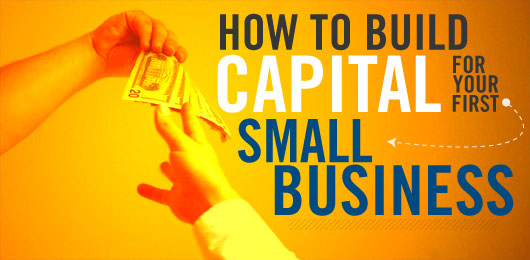If you've been draining in the workforce for a couple of years you may be starting to get the entrepreneurial itch. We break down the first step: how to get the funds to launch your project.
By Kevin Kaiser
So you’re ready to start a small business. Or at least that’s what you think.
Your endeavor will never take off unless you have a good source of business capital from the start. Simply put, business capital is money that you’ll invest in your small business. Once you have this money, you can buy a variety of things from pens and paper to company laptops.
There is no end to the list of ways to acquire business capital, but you’ll have to weigh each option based on your startup company’s needs. It’s best to consider the most common routes to business capital and go from there.
The first thing you’ll need is a solid business plan. No prospective lenders or investors will take you seriously until you’ve convinced them that your business will be financially successful. If people or banks are going to give you money, they definitely want to know what your business will do and how it plans to be profitable.
Now start looking for sources of business capital. Start with you. Selling assets—which range from flat-screen TVs, to that painting from your college art course—is an easy way to make money. It may not be much, but it’s better than nothing (and you won’t have to look at that wannabe-Pollock piece from 10 years ago). Consider how much out-of-pocket money you can put into your prospective business. Don’t liquidate everything you have, but you’ll never feel bad for contributing some cash yourself.
Borrowing against home equity is an option that better fits borrowers who have paid a majority of their mortgage. However, it can land you a huge chunk of business capital if you’ve paid six figures on your mortgage. Don’t forget that monthly payments start once the loan begins.
Conventional bank loans favor borrowers who have outstanding credit and a clean financial history. Check with your local government to find out if you qualify for small business grants. The U.S. Small Business Administration has several programs to jump start businesses. Long-term, fixed-rate loans as well as microloans are available through the SBA, which often include more favorable terms for business than conventional financing options. You can ask lenders, credit unions and banks about SBA loans since the SBA doesn’t issue the loan, it simply guarantees a certain amount.
Family and friends might want to help you become a business owner. But just because you’re close to them doesn’t mean you shouldn’t get written agreements acknowledging their money is a loan, not partial ownership. These people love you—or at least say they do—so offer return interest every three or four months.
Seek angel investors and/or venture capitalists. Finding such investors may not be easy, but something like trading equity for services is another great starting point. With an equity trade, you can grow your business in ways you couldn’t before, maybe not only because of money, but also because you don’t possess the necessary skills required to perform that. For example, the investing firm, Growth Partner, is exceptionally skilled at online marketing, so if that’s the weak point of your business setting up a deal with them would make your business grow exponentially. Should your business get some people’s attention, you might be hearing from new investors even. Angel investors usually shell out a large sum of their own money while venture capitalists buy a part of company and typically expect some stake in their latest investment.
With endless ways to come up with business capital, think about how much money you need and for what you need it. Don’t be afraid to come up with your own ways to raise money. Besides, being creative is a great trait for a business owner. After all, creativity is what made you enroll in that art class, right?
Kevin Kaiser is the author of Startup Biz Blog, where he writes about entrepreneurship, startups and small business. He’s been involved in three startups, two of which were Inc. 500 winners.















